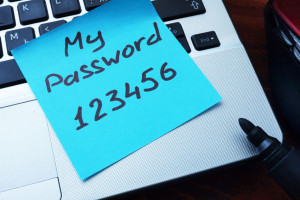 We’ll bet we can guess at least one of your passwords. Many passwords are painfully predictable, making them super easy to guess.
We’ll bet we can guess at least one of your passwords. Many passwords are painfully predictable, making them super easy to guess.
How well do your passwords protect your private information? Probably not as well as you think. In one recent test by a security firm, more than half of 625,000 passwords were easily breached by using common guessing techniques. The most common passwords used “123456″ followed by “Hello123″ and, not to be outdone, “password.”
Hackers also are able to detect passwords by searching common words that can be found in everyday language and conversation. When was the last time you changed your password? If you’re due for an update, here are some ways to create a better and more secure password.
Mix it up. Include a random mix of uppercase letters, lowercase letters, numbers and special characters.
Make it memorable. Utilizing a phrase can help make the password memorable. Just don’t forget to use a mix of characters. An example might be to turn “take me down to the river” into T@kemeDOWN2rvr.
Use a different password for each account. Never use the same password for multiple accounts. If one is breached, someone can easily gain access into your other accounts.
Don’t use names of your loved ones. Avoid using names of your spouse, children or pets.
Avoid these passwords. Some other really bad passwords are 12345, 12345678, test1, password, 12345678, qwerty, 1234567890 and 1234567.
Remember, it’s always a good idea to store your passwords in a secure location (such as a safe) away from your computer. Some savvy Web users employ free password storage tools such as LastPass, available as an extension for Chrome and Firefox, while others are content to keep them stored in their brains. Whatever you do, don’t forget to change your passwords several times each year.